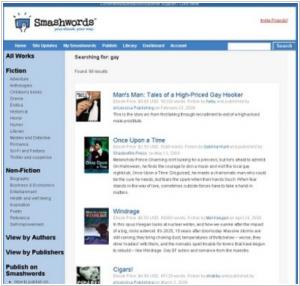Lulu vs Smashwords
Last updated: March 03, 2024
Lulu and Smashwords are both popular self-publishing platforms that offer authors the opportunity to bring their books to a digital audience. However, there are distinct differences between the two platforms. One key difference lies in their distribution networks. Smashwords has an extensive distribution network that includes major online retailers like Amazon Kindle, Apple Books, Barnes & Noble Nook, and Kobo, among others. This broad reach allows authors using Smashwords to potentially reach a wide audience across multiple e-reading platforms. In contrast, Lulu focuses primarily on its own bookstore and distribution channels, offering authors a more targeted approach to distribution. While Lulu does offer some distribution to other retailers, its emphasis is on direct sales through its platform.
Another notable difference between Lulu and Smashwords is their approach to book formatting and conversion. Lulu provides authors with a comprehensive set of tools and services to help them create and format their books for digital publication. The platform supports a wide range of file formats, including PDF, EPUB, and MOBI, and offers options for print-on-demand as well. Lulu also provides professional assistance for formatting and cover design for authors who prefer a more hands-on approach. On the other hand, Smashwords has its own proprietary conversion system called the "Meatgrinder." Authors upload their manuscript in a specific format, and Smashwords converts it into multiple e-book formats compatible with various e-reading devices. While this process can require more attention to formatting guidelines, Smashwords aims to simplify the conversion process and ensure compatibility across different platforms.
In terms of pricing and royalties, there are differences between Lulu and Smashwords. Lulu offers authors a variety of pricing options, allowing them to set their own book prices and control their profit margins. The platform also provides transparent royalty rates, with authors receiving up to 90% of the revenue generated from their sales. Additionally, Lulu offers authors the option to create discount codes and promotions to engage readers. Smashwords, on the other hand, offers a standard royalty rate of 60% for sales made through its retail partners and 85% for direct sales through the Smashwords store. The platform also provides authors with the flexibility to set their own prices and offers tools to create special promotions or free book giveaways.
Another notable difference between Lulu and Smashwords is their approach to book formatting and conversion. Lulu provides authors with a comprehensive set of tools and services to help them create and format their books for digital publication. The platform supports a wide range of file formats, including PDF, EPUB, and MOBI, and offers options for print-on-demand as well. Lulu also provides professional assistance for formatting and cover design for authors who prefer a more hands-on approach. On the other hand, Smashwords has its own proprietary conversion system called the "Meatgrinder." Authors upload their manuscript in a specific format, and Smashwords converts it into multiple e-book formats compatible with various e-reading devices. While this process can require more attention to formatting guidelines, Smashwords aims to simplify the conversion process and ensure compatibility across different platforms.
In terms of pricing and royalties, there are differences between Lulu and Smashwords. Lulu offers authors a variety of pricing options, allowing them to set their own book prices and control their profit margins. The platform also provides transparent royalty rates, with authors receiving up to 90% of the revenue generated from their sales. Additionally, Lulu offers authors the option to create discount codes and promotions to engage readers. Smashwords, on the other hand, offers a standard royalty rate of 60% for sales made through its retail partners and 85% for direct sales through the Smashwords store. The platform also provides authors with the flexibility to set their own prices and offers tools to create special promotions or free book giveaways.
44
Lulu pioneered the self-publishing industry and paved the way for people around the world to publish books and bring them to market, while allowing authors to retain full control of their work. Operating a global network, Lulu provides worldwide distribution so that authors can reach readers just about anywhere via print, e-readers and tablet devices. As the leading independent self-publishing company, Lulu has enabled people in more than 225 countries and territories to self-publish nearly two million publications, including 1.5 million books.
38
Smashwords is the world's largest distributor of indie ebooks. We make it fast, free and easy for any author or publisher, anywhere in the world, to publish and distribute ebooks to the major retailers. We provide free tools for marketing, distribution, metadata management and sales reporting. At Smashwords, our authors and publishers have complete control over the sampling, pricing and marketing of their written works.
Lulu vs Smashwords in our news:
2024. Self-publishing platform Lulu integrates with website builder Wix
Directly selling books to your audience is paramount for audience growth and revenue increase, as it empowers you to oversee the purchasing process. With traditional retail channels becoming less dependable, Lulu Direct provides a solution, facilitating the connection between your personal ecommerce platform and Lulu's global print-on-demand network. Now, with expanded integration with Wix, you can seamlessly link your Wix site to Lulu Direct, streamlining direct book sales and providing sales tracking and management through Lulu Direct's dashboard. Although Wix may not offer as many ecommerce plugins as Shopify or the customization of WordPress, its user-friendly interface makes it the simplest platform for site creation and maintenance.
2022. Lulu unveiles Cover Designer
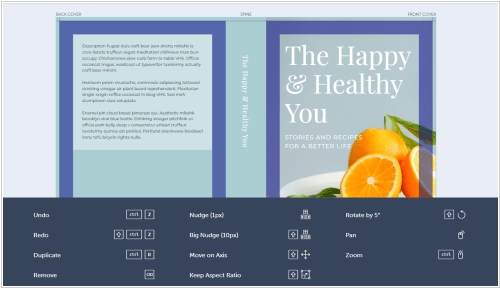
Lulu, a self-publishing platform, has introduced a new tool for designing book covers. While experienced designers and those familiar with design software may prefer a book cover template, Lulu's cover designer offers a simpler alternative for those creating books as gifts, limited editions, or for beta readers. This tool streamlines the design process by automatically calculating the spine width and position. It is compatible with all of Lulu's trim sizes but specifically designed for paperback books, allowing users to design their book covers while publishing on Lulu. The cover maker provides several design options, including templates, image uploads, text boxes with customization options, customizable shapes, and the ability to incorporate an ISBN barcode by entering the relevant information.
2022. Self-Publishing service Draft2Digital to acquire competitor Smashwords
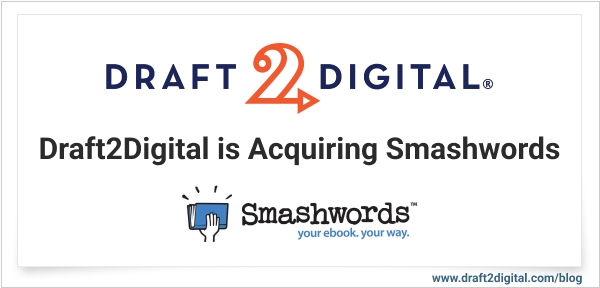
Draft2Digital, a pioneer in the field of ebook self-publishing, is set to acquire its competitor, Smashwords. This acquisition will enable authors who use Draft2Digital to gain access to the Smashwords Store, as well as its exclusive book marketing tools, such as Smashwords Coupons, self-serve merchandising, Author Interviews, and the patent-pending Smashwords Presales tool for book launches. Meanwhile, authors who use Smashwords will benefit from new tools that simplify both print and digital publishing, leading to greater success. These tools include D2D Print, Draft2Digital's Print on Demand service for paperbacks, improved metadata management tools for better book discoverability at retailers, automated end-matter for series books, payment splitting for co-authors and collaborations, and more payment options, including direct bank deposits. Retailers and libraries served by both companies can expect a wider selection of titles and improved merchandising recommendations. Customers of the Smashwords Store can also look forward to an improved store experience and an increased selection of books from the many great authors and publishers distributed by Draft2Digital.
2015. Smashwords allows authors to offer preorders without final ebook files
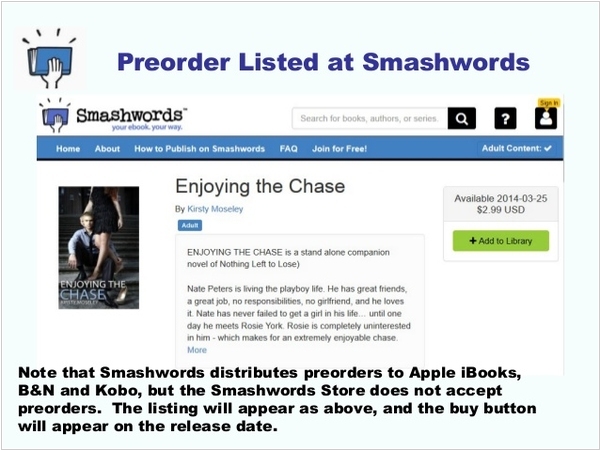
Popular self-publishing platform Smashwords has introduced a new feature that allows authors to initiate preorders for their titles up to one year in advance, even before uploading the final assets such as the finished manuscript and cover image. While Smashwords has offered preorder capabilities for over two years, it was limited to titles with ready and finalized files. Interestingly, Smashwords reports that 67% of its top 200 best-selling titles initially began as preorders on their platform. However, only a small fraction of Smashwords' extensive community of over 100,000 authors and indie publishers have utilized preorders, mainly due to the unavailability of final files until just before the official release. This recent change aims to enable more Smashwords users to generate revenue from their titles at an earlier stage. The company considers this new feature to be their most ambitious enhancement to date.
2014. Smashwords partners with Overdrive to bring more self-published books to libraries
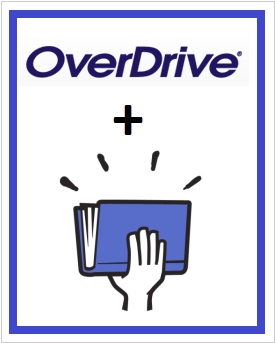
Self-publishing platform Smashwords has expanded its reach by entering into a partnership with Overdrive, the largest digital library distributor in the country. This collaboration enables Overdrive's extensive network of library clients, which includes approximately 28,000 libraries and schools worldwide, to procure and lend out around 200,000 ebooks authored by 88,000 writers from Smashwords. The significance of this partnership lies in the fact that Overdrive works with numerous libraries and supports Kindle e-readers, setting the stage for broader global exposure for titles by Smashwords authors. As a result, these authors have the opportunity to reach a larger audience of readers through this expansive distribution network.


